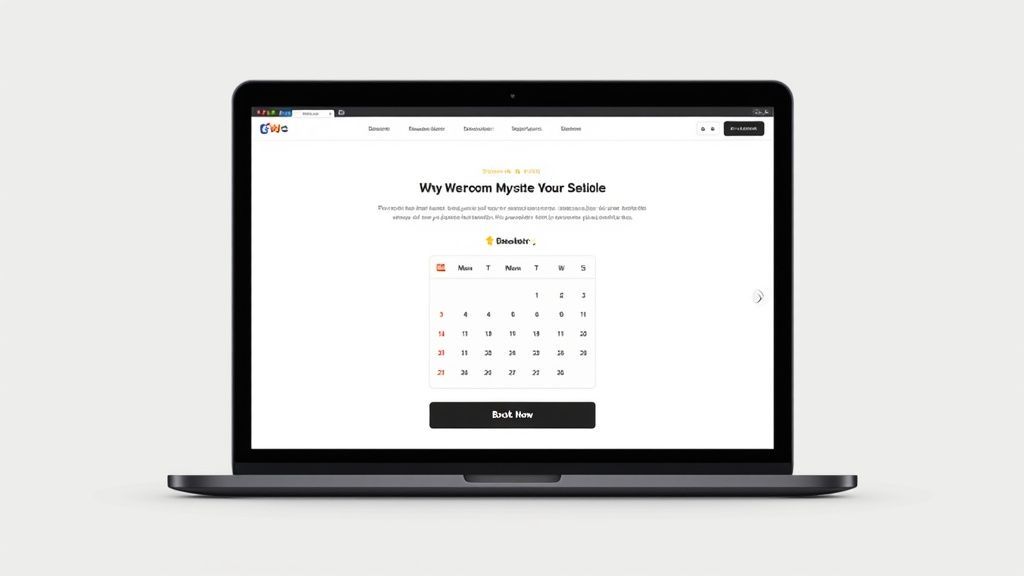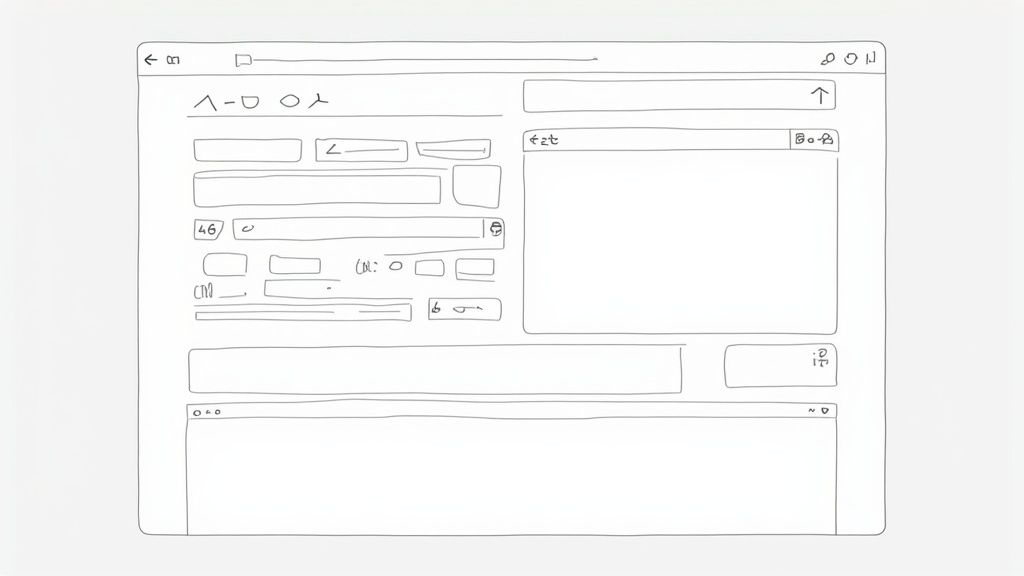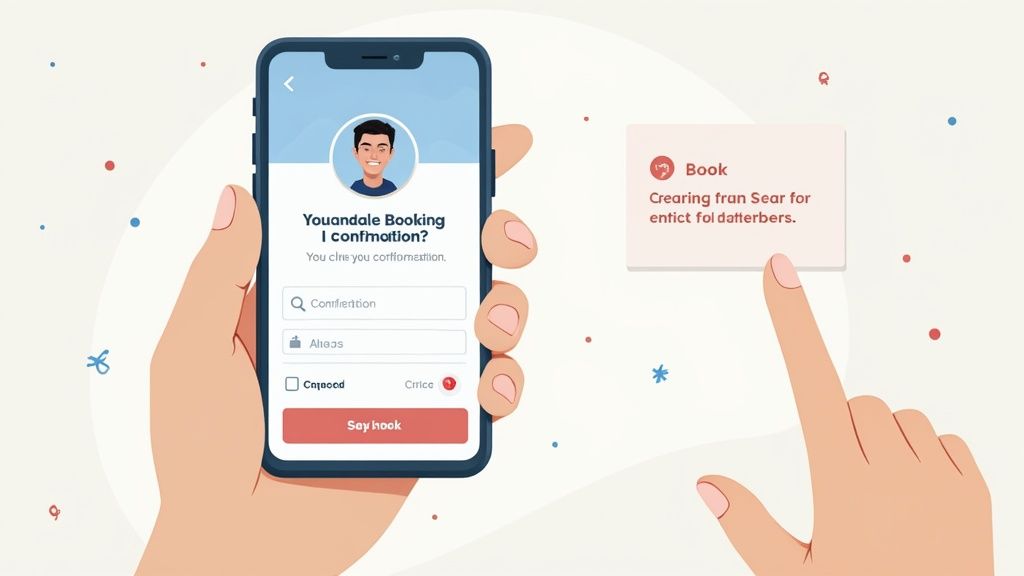At its core, a direct booking website is your very own online storefront. It’s where you can take reservations and process payments directly from guests, all without paying those eye-watering commission fees to third-party platforms. Think of it as the headquarters for your brand, putting you firmly in the driver’s seat.

Let’s be honest. Relying completely on Online Travel Agencies (OTAs) like Airbnb or Vrbo is like building your beautiful business on rented land. Sure, they get you in front of a lot of eyes, but they also call all the shots, skim a hefty chunk off the top, and put a wall between you and the people staying in your property.
Launching your own direct booking site is hands-down the most powerful move you can make to build a real, sustainable asset for your hospitality business. And this is about so much more than just dodging commission fees, though the savings are definitely a huge plus. It’s about finally taking ownership of your brand and curating the entire guest experience yourself, from that first click to the final goodbye.
To really see the difference, it helps to put the two models side-by-side.
| Feature | OTA Booking | Direct Booking |
|---|---|---|
| Guest Relationship | Indirect; guest is the OTA’s customer. | Direct; guest is your customer. |
| Booking Fees | 15-20% commission on average. | Typically 0-3% for payment processing. |
| Brand Control | Limited; your listing looks like all others. | Complete control over branding and design. |
| Guest Data | Owned by the OTA. | You own all guest contact information. |
| Policies & Rules | Restricted by OTA’s platform-wide rules. | You set your own custom policies. |
| Marketing | Reliant on the OTA’s algorithm and reach. | You can run your own marketing campaigns. |
As you can see, the shift from relying on OTAs to running your own site is a shift from being a listing to being a business.
When a guest books through an OTA, they’re really a customer of that platform. But when they book through your site? They become your guest. That’s a game-changing distinction.
Your own website is your canvas. It’s where you can truly show off your property’s unique personality, tell its story, and set policies that actually work for you—not for a giant corporation.
You’re in charge of everything:
By owning your booking channel, you transform from a simple listing into a genuine hospitality brand. You’re no longer just another option in a crowded marketplace; you are the destination.
This might be the most underrated perk of them all: you get to own your guest data. OTAs guard that information like a hawk, but with direct bookings, every email address and phone number belongs to you.
That data is pure marketing gold. You can build an email list to announce special offers, share exciting updates about your property, and send targeted promotions to entice past guests to come back for another stay.
The market is already telling us this is the way forward. While OTAs control about 40% of the market, a huge 80% of travelers now admit to using them for research before hunting down the property’s own website to book direct. Why? They’re looking for better deals and a more personal touch. This trend presents a massive opportunity for hosts who have their own independent online presence.
Your direct booking website is the key to capturing this incredibly valuable traffic and building a business that lasts.

Before you can welcome guests through your own digital front door, you need to actually build it. This whole process starts with two foundational pieces: a domain name and a website platform. Think of these as your business’s online real estate and its architectural plans—they set the stage for everything that comes next.
Your domain is your address on the internet, and it should be more than just a URL. It’s often the very first piece of branding a potential guest will encounter. A great domain is easy to say, spell, and, most importantly, remember.
You’ll want to aim for a name that truly reflects your property’s unique character or the experience you offer. Instead of a generic name like “VacationRental123.com,” get creative with something more evocative. If you have a lakeside cabin, a name like “SereneShoresRetreat.com” or “TheLoonsNestGetaway.com” instantly paints a picture and sticks in a guest’s mind.
Here are a few tips I’ve picked up for brainstorming the perfect domain:
.com extension. It’s still the most recognized and trusted domain extension around the globe.Once you have a few ideas, use a domain registrar like GoDaddy or Namecheap to check their availability. Nailing this first step solidifies your brand identity and gives your future direct booking website a professional home.
With your domain secured, the next big decision is choosing where to build your site. The platform you select will determine how easy it is to design, manage, and eventually scale your online presence. For most hosts, a dedicated website builder is the most practical path forward.
Your platform isn’t just a technical tool; it’s your business partner. The right choice simplifies your operations, while the wrong one can create endless headaches. Choose based on your long-term goals, not just the initial setup.
Let’s look at a few popular options and what they bring to the table:
| Platform | Best For | Ease of Use | Key Consideration |
|---|---|---|---|
| Squarespace | Visually-driven brands who value sleek design templates. | Very high | Requires integrating a third-party booking engine. |
| Wix | Beginners looking for maximum drag-and-drop creative freedom. | High | The sheer number of options can sometimes feel overwhelming. |
| WordPress | Hosts who want ultimate control and customization. | Medium to Low | Has a steeper learning curve and requires more management. |
While these general-purpose builders are definitely viable, many hosts find that a dedicated vacation rental website builder is a more efficient choice. These platforms are purpose-built for our industry, often bundling design, booking engine integration, and marketing tools into one clean package.
This kind of all-in-one integration can save you a ton of time and prevent the technical issues that pop up when you’re trying to piece together different systems. By choosing a platform designed specifically for your needs, you lay a much stronger foundation for success.
 Just having a direct booking website isn’t enough to make a real difference. A great platform is just the starting point. Your site has to do more than simply exist—it needs to actively convince visitors to become paying guests. This is where smart, conversion-focused design comes in, turning casual browsers into confirmed bookings by making the whole experience feel intuitive, trustworthy, and completely seamless.
Just having a direct booking website isn’t enough to make a real difference. A great platform is just the starting point. Your site has to do more than simply exist—it needs to actively convince visitors to become paying guests. This is where smart, conversion-focused design comes in, turning casual browsers into confirmed bookings by making the whole experience feel intuitive, trustworthy, and completely seamless.
It all starts with stunning visuals. I can’t stress this enough: professional, high-resolution photography isn’t a luxury; it’s a non-negotiable. Your photos are your digital handshake, the first thing that tells a potential guest about the quality and vibe of your property. Pair those amazing images with compelling property descriptions that tell a story, not just list off amenities. If you need some pointers, we have a whole guide on how to optimize your vacation rental listing with powerful storytelling.
From the moment a visitor lands on your homepage, their path to the confirmation page should feel effortless. Every single element needs to guide them logically toward making that booking. This means creating a smooth, frictionless journey without any confusing dead ends or frustrating loops.
Your design should absolutely nail a few key elements:
The goal is to remove every single ounce of friction from the booking process. Make it so easy and trustworthy to book directly that going back to an OTA feels like a step backward.
In today’s market, how your website looks and works on a smartphone is just as important—if not more so—than on a desktop. Let’s face it, most travel planning and booking happens on the go. In fact, mobile devices drove a whopping 68% of all web traffic to travel and hospitality sites in 2023.
And that trend is only getting stronger. The mobile travel booking market is projected to explode from $228 billion in 2024 to over $526 billion by 2032. You can dig into more online travel booking stats, but the takeaway is clear: a mobile-first approach is essential if you want to capture this massive audience.
This means your website has to be fully responsive. Think large, easy-to-tap buttons, readable text without pinching and zooming, and a simplified navigation menu. The booking process itself has to be streamlined for smaller screens, requiring minimal typing and a dead-simple payment flow. Honestly, ignoring your mobile users is like closing the front door on the majority of your potential guests.

Let’s be honest—a beautiful website without a way to take reservations is just an online brochure. To turn your site into a real, revenue-generating asset, you need a booking engine. This is the technical heart of your entire operation, the software that securely processes bookings and payments right on your website.
Think of it as your digital front desk. It’s always on, always accurate. But the magic doesn’t stop there. Most modern property management systems (PMS) come with a booking engine and a channel manager bundled together. If you plan to list on OTAs and your direct site, this is absolutely essential. It acts as a central hub, syncing your availability across every platform in real time.
When a guest books a week in July on your website, the channel manager instantly blocks those dates on your Airbnb, Vrbo, and Booking.com calendars. That simple, automated action is your single best defense against the dreaded double booking.
Choosing your software is a big deal. It’s going to become the command center for your rental business, so you want to get it right. The market is full of great options, but they’re all tailored to slightly different needs. Your job is to find the one that clicks with your portfolio size, technical comfort, and budget.
To give you a clearer picture of what’s out there, let’s look at some of the leading contenders.
The sheer number of options can feel overwhelming. To help you narrow it down, here’s a quick comparison of some of the top platforms that hosts trust. Each one has a different philosophy, so think about which approach best aligns with how you want to run your business.
| Software | Best For | Key Feature | Pricing Model |
|---|---|---|---|
| OwnerRez | Hosts with 1-20+ properties who want deep customization and control. | Powerful integrations and robust reporting features. | Per-property subscription. |
| Lodgify | Hosts who want an all-in-one website builder and booking software. | Integrated website templates and a user-friendly interface. | Tiered subscription based on property count. |
| Guesty | Property managers with large portfolios looking for advanced automation. | Unified inbox, task management, and extensive automation tools. | Percentage of booking revenue. |
As you can see, OwnerRez is a favorite for its incredible depth and control, while Lodgify excels at getting hosts online quickly with an all-in-one solution. Guesty, on the other hand, is a powerhouse built for scaling larger operations. The “best” one is simply the one that fits your specific goals.
It’s easy to get lost in a sea of features when comparing software. To cut through the noise, just focus on the core functions a modern direct booking website absolutely needs to succeed.
Your booking software isn’t just a tool; it’s the engine of your entire guest management workflow. Prioritize reliability, seamless integration, and secure payment processing above all else. A glitchy system can cost you bookings and damage your brand’s reputation.
Before you commit, make sure any software you’re considering checks these essential boxes:
Taking the time to choose your software thoughtfully is one of the most important things you’ll do. It automates your workflow, protects you from costly mistakes, and gives your guests a professional, secure experience from start to finish.
Alright, let’s talk about getting some eyeballs on that gorgeous new website of yours.
You’ve built a stunning direct booking site with a slick, easy-to-use booking engine. That’s a huge win, but it’s only half the job. If would-be guests can’t find your property online, even the most beautiful design won’t fill your calendar. This is where you put on your marketer hat.
It’s time to get smart with search engine optimization (SEO) and content that draws the right people directly to you.
The great news? You don’t need a massive marketing budget to make a dent. The online travel space is definitely competitive, with digital channels pulling in around 70% of all tourism revenue globally. While the big players dominate, there’s a massive opportunity for independent hosts who offer something the giants can’t: a better, more personal experience.
Your biggest weapon against the massive OTAs is your deep, local knowledge. That’s not just a nice-to-have; it’s a marketing superpower. Local SEO is how you get your direct booking website in front of travelers who are actively looking for a place to stay right in your neck of the woods.
It all starts with your Google Business Profile (what used to be called Google My Business). This free listing is probably one of the most powerful tools in your arsenal. Don’t just set it and forget it—optimize the heck out of it.
Now, put yourself in your guests’ shoes. What are they actually typing into Google? They aren’t just searching “cabin rental.” They’re getting specific: “pet-friendly cabin in Asheville” or “beachfront cottage near Cannon Beach with a hot tub.”
These longer, more detailed phrases are your long-tail keywords. Weave them naturally throughout your website—in your main page descriptions, your photo captions, and especially in your blog posts.
Content marketing is your chance to stop selling and start helping. When you create genuinely useful content, you stop being just another rental and become a trusted local guide. You start building a relationship with guests before they even think about checking your availability.
Don’t just show guests where they’ll sleep. Show them the experience they’ll have. Your content is the bridge between your property and the memories they came to create.
Think about it: what questions does your ideal guest have before they even book their trip? A blog on your website is the perfect home for all those answers.
Here are a few content ideas that work like a charm:
Every blog post is another hook in the water, another chance to rank for local keywords and prove your incredible value. You’re not just offering a place to stay; you’re handing them the key to an unforgettable trip. That’s how you build trust and make booking directly with you a total no-brainer.
Jumping into the world of direct bookings can feel like a big step, and it’s totally natural to have questions. A lot of hosts I talk to wonder about the practical side of running their own direct booking website alongside the listings they already have. Let’s clear up some of the most common concerns to give you the confidence to move forward.
The good news? Creating your own site doesn’t mean you have to start from scratch or ditch the channels that already bring you guests. Think of it as adding a powerful, more profitable lane to your booking highway.
Absolutely, and you definitely should. A direct booking site isn’t about replacing the OTAs; it’s about complementing them. The key to making this work without the chaos is a brilliant piece of tech called a channel manager. This tool is the secret sauce and is often bundled with your booking engine software.
A channel manager syncs your calendars across all your platforms in real-time. So, when a guest books a week directly on your site, those dates are instantly blocked on Airbnb, Vrbo, and everywhere else. This simple automation is a lifesaver—it prevents double bookings and lets you keep enjoying the massive visibility of the OTAs while you start funneling more profitable, commission-free bookings through your own website.
This is the big question on everyone’s mind, and the honest answer is: it really varies. The cost can be anywhere from a few hundred dollars a year to several thousand, all depending on the path you choose. But you don’t need a massive budget to get started.
For a very manageable cost, you can use a template-based website builder combined with a subscription to a booking engine. The main expenses you’ll run into are:
A fully custom-built website is a much larger investment, potentially costing several thousand dollars upfront. Honestly, for most hosts, today’s template-based solutions offer more than enough power and professional polish to create a highly effective direct booking site without breaking the bank.
Handling payments securely is non-negotiable, but thankfully, you don’t have to become a security expert yourself. Your booking engine is specifically designed to handle this entire process for you with maximum security.
Any reputable booking software will integrate directly with trusted, PCI-compliant payment gateways like Stripe and PayPal. This means every transaction is fully encrypted and secure from start to finish. The system manages everything—from collecting the guest’s card info to processing payments and even handling security deposits. You never have to directly touch or store sensitive financial data, which protects both you and your guests.
Think of your booking engine as your secure, automated financial partner. It takes on the complex responsibility of payment processing so you can focus on being a great host.
It definitely requires a different strategy, but getting traffic to your own site is very achievable. While OTAs give you a built-in audience, building your own traffic creates a far more sustainable and valuable business asset in the long run. Success really hinges on a smart mix of marketing efforts.
Your strategy should include things like local SEO, getting active on social media, creating helpful content, and—most importantly—building an email list of past guests to encourage repeat visits. It won’t happen overnight, but the rewards are huge. Instead of being just one of thousands of listings, you become a destination in your own right. For a deeper dive, our guide on essential vacation rental management software covers tools that can help streamline these very marketing efforts.
Ultimately, running a direct booking website gives you control, builds your brand, and dramatically increases your profitability—all while co-existing peacefully with your OTA listings.
Ready to take control of your bookings and build a stronger brand? BnBuddy provides the AI-powered tools you need to create a professional website, automate guest communication, and drive more direct revenue. Start your free beta trial today and see the difference for yourself at https://bnbuddy.com.
Leveraging AI to streamline property operations, enhance guest experiences, and increase earnings.


